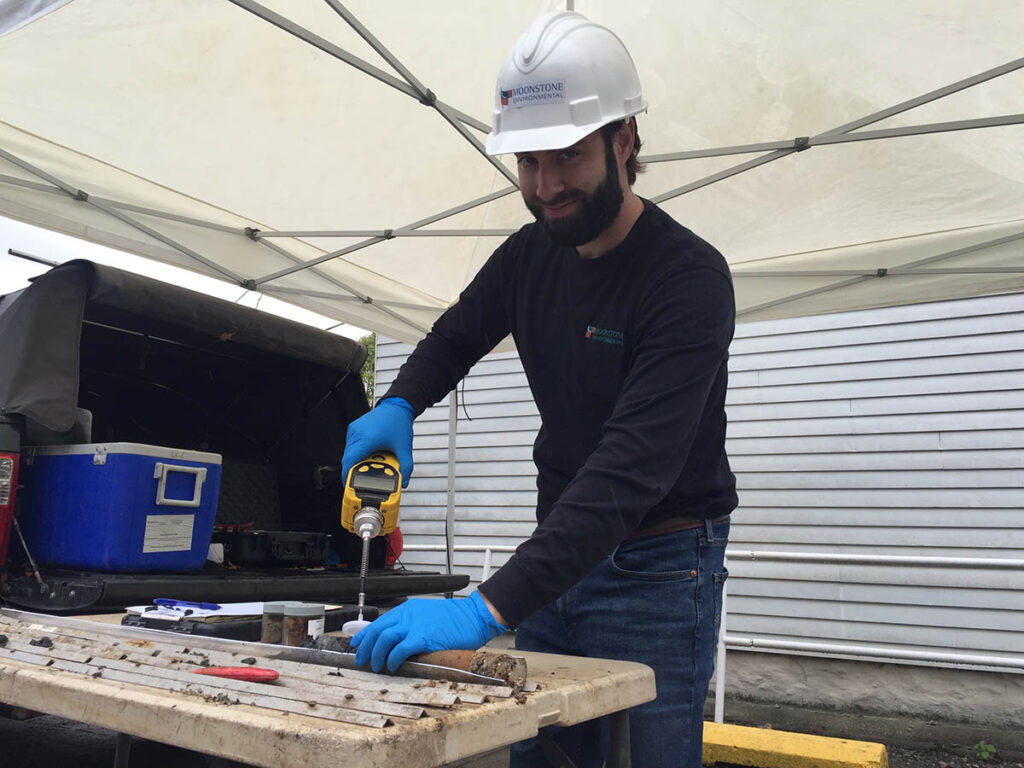By Bryan Hay
Bryan McAtee ’11 (geology) helps bring history back to life.
As part of his work as field manager for Moonstone Environmental of Fogelsville, Pa., he probes soil to check for possible contaminants before any work begins to rehabilitate historic industrial sites around the Lehigh Valley.
His geoprobe sampling work involves driving a rod casing into the ground at certain depths to extract a cylindrical soil sample that, in some cases, resembles a soil parfait, revealing layers for sampling and analysis.

Bryan McAtee ’11
“The cool thing about geoprobe sampling is that you can pull up an undisturbed core of soil, so you can see exactly what’s happening at 6 feet below the ground or even 60 feet below the ground,” he says.
His work on projects in Pennsylvania’s Land Recycling Program, which involves the voluntary cleanup of contaminated commercial and industrial sites, has led to the redevelopment of the Simon and Stewart silks mills in Easton into economically viable properties, with similar goals at the Waterfront and former Neuweiler Brewery in Allentown.
“It’s a program that was designed for these old industrial sites. In the Lehigh Valley, there are a lot of old steel mills and manufacturing properties, and through this program, those sites can be assessed for environmental problems, cleaned up as necessary, and then repurposed for either residential or nonresidential use,” McAtee says. “At Moonstone, we’re adept at navigating the program.”
Soil sampling provides a snapshot of what’s actually going on in the soil and clues into possible contamination of groundwater at the site. “We then take that data, and determine what needs to happen as far as remediation and mitigating any ongoing issues that might exist using engineering or administrative controls on the property,” he says.
Giving new life to these properties motivates McAtee.
“We’re not just making them neutral—we’re helping make them into something really beneficial,” he says. “Lafayette students, staff, and faculty might have been down to the Simon Silk Mill, and they can see that it’s now a thriving center for dozens of businesses. It’s really cool to be part of that.”
McAtee credits his STEM foundation at Lafayette for preparing him for his career. “I knew going into Lafayette that I wanted to do something sciencey,” he says, noting that he didn’t want to pursue engineering but a field related to environmental science. When he got hooked on geology, he took almost every course the program offered and finished the requirements for the degree a semester early.
Interim trips to Wyoming, the Galapagos, and Ecuador provided exposure to unique field experiences, and McAtee says his professors never led show-and-tell classes, instead pushing students to figure things out on their own.
“They gave us instruments, they gave us field notebooks, and they gave us sort of the rundown of what we were looking for. And then it was up to us to figure out the best way to collect and record and interpret data,” he says. “I came out feeling very, very comfortable. As soon as I was thrown into the real world, I realized the importance of being self-sufficient. Thank goodness the professors in the department did it that way.”
